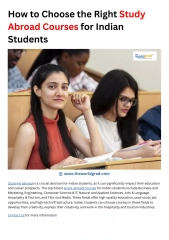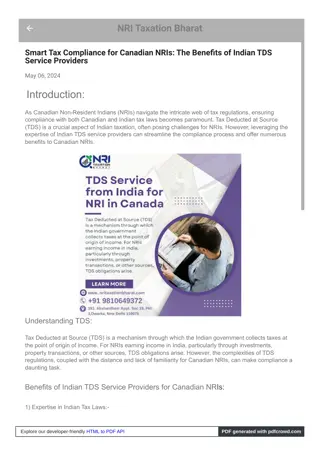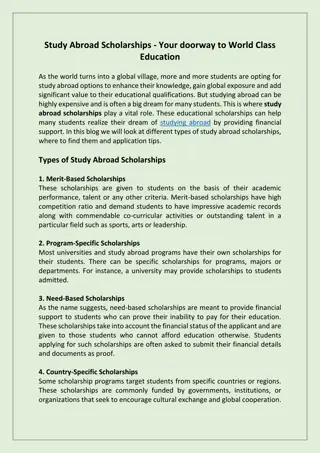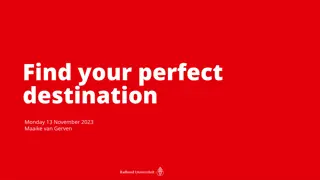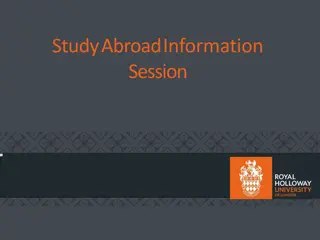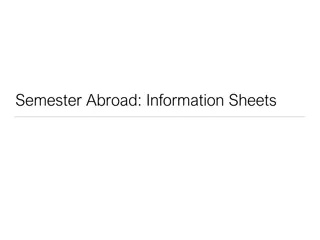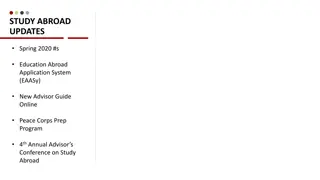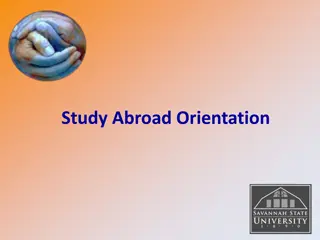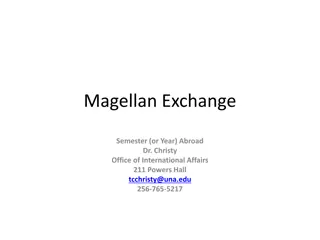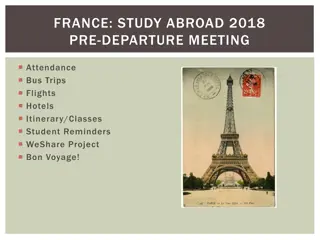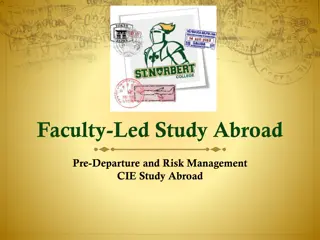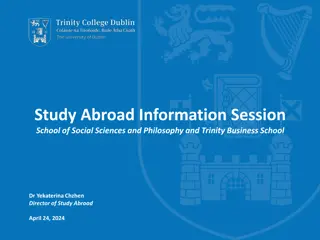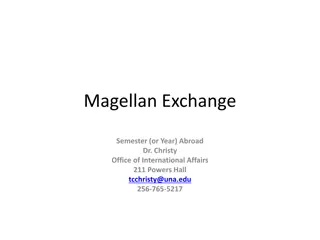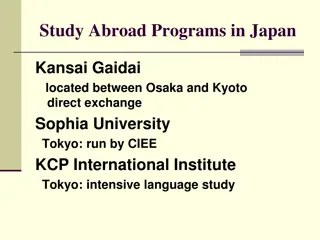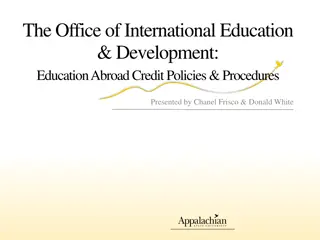Market your Study Abroad Experience
Elevate your study abroad experience with valuable insights from Chelsey Mullins, a knowledgeable study abroad advisor at Purdue University. Whether you're seeking guidance on choosing the right program, navigating cultural differences, or making the most of your time overseas, Chelsey's expertise can make a significant difference. Reach out to mullins4@purdue.edu to unlock the full potential of your study abroad adventure.
Download Presentation

Please find below an Image/Link to download the presentation.
The content on the website is provided AS IS for your information and personal use only. It may not be sold, licensed, or shared on other websites without obtaining consent from the author.If you encounter any issues during the download, it is possible that the publisher has removed the file from their server.
You are allowed to download the files provided on this website for personal or commercial use, subject to the condition that they are used lawfully. All files are the property of their respective owners.
The content on the website is provided AS IS for your information and personal use only. It may not be sold, licensed, or shared on other websites without obtaining consent from the author.
E N D
Presentation Transcript
Market your Study Abroad Experience Chelsey Mullins Study Abroad Advisor mullins4@purdue.edu
WHY ARE YOU HERE? Resumes and Cover Letters Understanding Experiences and Skills Interview Tips and Strategies NOTE: Page numbers in this presentation refer to the CCO Career Planning Handbook, which can be accessed here: https://www.cco.purdue.edu/Students/WhatWeOffer#CCOHandbook
A NOTE ON THIS SESSION We are going to go over many different ways to talk about study abroad on a resume, in a cover letter, or in an interview. The goal is that you will be able to weave your study abroad experience into these scenarios but be careful about going on and on about them. You ve also had many other life experiences that may be more relevant depending on the situation or question you are being asked. While we re focusing on study abroad to give you ideas and examples to leverage your experience, use your best judgment. The goal isn t to use it for every interview answer, but to get a better idea of when it can serve you best.
COVER LETTER Pages 37-38 How does your experience relate to your field? What are the transferable skills? How might your international experience uniquely benefit a professional in that field? Develop a strategy to specifically address these points in your cover letter Example: My studies in Japan provided me with a great insight into the cultural differences that influence consumers in different countries and improve my ability to contribute to international marketing initiatives. Even if your career goals do not include a specific international dimension at this time, you can promote the general transferable skills independence, confidence, and problem solving
COVER LETTER Your cover letter doesn t have a lot of room to work with, so the goal is to craft 1-2 sentences that articulate why your study abroad experience matters to the employer. Don t throw it in as an afterthought, have a purpose for including it. Can t think of a purpose? It s ok to leave it out if you can t find a way to make it serve you well in the cover letter. - DO: use an example like on the previous slide to tie your experience into the position you are applying for. - DON T: I also studied abroad in Australia. - This gives the employer no context and seems like an afterthought.
RESUME Pages 15-18 Be sure to locate your international experience in the best place or places on your resume for your intended job. Study abroad is part of your education put it in the education section! It will be noticed more here and speaks to it s importance. If you did an internship, list it as work experience and concentrate on the skills most relevant to the job position you are applying for. If your resume includes a section for skills or proficiencies, include specific skills acquired or improved while abroad.
RESUME How to list an interrupted study abroad semester on your resume: -If you did not get to begin your experience, we recommend not putting it on your resume. Instead, use it as a talking point in an interview or cover letter about how you can adapt to challenging situations, such as finding out last-minute that a global pandemic caused your plans to fall apart. Tell how you handled it, and how you persevered despite challenges. Stay positive.
RESUME How to list an interrupted study abroad semester on your resume: -If you had to come home early or change to online learning in-country: list the experience on your resume under education. You did complete the semester and earn the credits, though part of it had to be remote. -Do not lie about the length of time you were in-country if asked, but it s still ok to say Spring 2020 for the experience. -You can also use examples of your flexibility and adaptability in future interviews or in a cover letter.
THE INTERVIEW If you have study abroad on your resume, you must be prepared for the most common question you ll get which is almost always a version of the question on the next slide
I see you studied abroad, can you tell me about that?
BE READY! Be ready to answer Develop stories and responses in advance Show it was a learning experience Provide examples This is not a question you should stumble through, as you can assume in advance it will be asked!
A potential employer may not have studied abroad and may not understand what the experience means. It s up to you to effectively communicate the skills and proficiencies that will benefit their organization and convince them of the value of your experience.
TAKE INVENTORY Courses/Academics What classes did you take? Were you classes mostly with other US students, local students, or a mix? Professional Experience Abroad Did you join any Activities/Clubs? Work on Projects? Meet professionals? Organize work Part-time/Research/Volunteer? Country-Specific Skills Specific cultural traits you learned to adapt to? Universal Cross-Cultural Skills Examples: Culture shock, adaptable, open minded, observant, better understanding of self, brave, sense of adventure Language Skills Level of reading, writing and speaking (Do not exaggerate skill, be honest) General Work Skills Manage change, independent, self-disciplines, persistence, flexibility
TAKE INVENTORY Make a written inventory of anything you can think about related to your experience you ll be surprised how easy some of it is to forget later that could make a really excellent career story! Even if it doesn t seem very relevant, write it down anyway The previous slide gave you things to think about including, but jot down anything else you can think of as well. When writing a cover letter, tailoring your resume or preparing for that interview, go back to your inventory for ideas and inspiration.
WHAT SKILLS DID YOU GAIN OR ENHANCE? Skills that professionals with international experiences cite as being particularly useful in their careers include: Enhanced cultural awareness and sensitivity to customs and cultural differences Communication (despite barriers) Adaptability, learn quickly Ability to identify and achieve goals General improvement in communications skills Increased confidence, initiative, and independence Greater flexibility, sense of humor Awareness of global economic and political issues and realities Ability to maintain an open mind and be tolerant of others Clarification of goals and improved self- awareness General travel skills Resource management Organization Problem solving (handle situations) Crisis management Patience Listening and observation Specific professional skills or knowledge base Time management Accept Responsibility Leadership
WHAT SKILLS DID YOU GAIN OR ENHANCE? Qualities that professionals with international experiences cite as being particularly useful in their careers include: Qualities Self-reliance Appreciation of diversity Perseverance Flexibility Tolerance/open-mindedness Assertiveness Inquisitiveness Self-confidence Self-knowledge Independence High energy level/enthusiasm Patience Listening and observing Enhanced cultural awareness
EXPLAINING INTERNATIONAL EXPERIENCE Be professional Use the language of your work people may not understand intercultural terms if they re never had to learn/experience them: Culture shock=adjustment Cross-cultural adaptability=able to deal with change Cultural sensitivity=interpersonal skills Cross cultural communications=effective listening skills Speak of your successes Not of challenges or why you did not succeed at something Shocking stories or misadventures Leave out bizarre stories, misadventures, difficulties unless you can shortly describe it and end with the solution and how you learned a valuable skill. If you tell a story, you must have a purpose for doing so Network with other returnees
SELL YOURSELF Boast on your Skills Say what others say about you Say why you were successful Say how you do things Write an Elevator Pitch Tell me about yourself Main selling points (2 paragraphs) Hard skills (work, study, volunteer experience) Skills (what makes you succeed) Stock up on Career and Intercultural Expereince Stories Role when working with student teams abroad Encounters when meeting professionals Encounters that gave insight into local culture Links between US and host country
SELF-REFLECTION TO GET YOU STARTED Share an example of how you set priorities to achieve a desired outcome in your study abroad experience. How did your study abroad experience enhance your knowledge, skills, and understanding of your intended career field? What assets might international study yield as opposed to someone who studied domestically? Share an example of how your international experience has improved your skills in communication with others. How might this make you a better professional in your field? How did you adjust/adapt to your new cultural surroundings? Share examples from academic, social, work settings. How did these influence your ability to interact successfully with others? Share an international experience in which you had to resolve a conflict or solve a problem. What skills and personal qualities did you tap into? How did the experience help you grow as a person? Share an example of a study abroad experience in which you took initiative to achieve a greater result. What was the most significant thing you learned about yourself through your study abroad experience? Why? Identify an experience that would demonstrate that you can take personal risks and act independently.
STAR WHAT IS IT? Concise, descriptive responses ---page 44 Tell me about a time when you had to accomplish something with little supervision. S Describe the situation. While studying abroad in Germany, I found that my coursework was extremely different from what I was accustomed to at Purdue. I was used to having assignments due throughout the semester, but for my German courses the entire grade was based on the final with no accountability beforehand. T What was the task that had to be done? During that semester I was taking a full-load of coursework for my major, and I was really motivated to do well during my semester abroad. I knew I had to figure out a way to stay on top of all the information I was learning because it would be impossible to do well at the end of the semester if I left it all to the end. A What action did you take? I had to act as a self-starter, and I set out a structured study plan for myself for the entire semester. I formed small study groups with a couple of friends for each of my classes, and we d meet over coffee once a week. R What were the results? I developed strong time management skills because of the new type of academic setting I experienced in Germany. Because I kept up with my study plan through the semester, I ended up earning A s and B s in my classes, and I was able to keep my stress level down before final exams.
PUT INTO ACTION Formulate your responses and stories Develop examples of how you gained skills Identify skills in the job description and create examples Use other examples also, not everything needs to be international The interview is your chance to speak to your qualities and qualifications; knowing what you want to say before you even enter the interviewer s office or pick up the phone can be a helpful tool in assuring that you ll be able to do that. Having some STAR stories prepared in advance can help you be sure you don t leave until the employer knows all you want him or her to about who you are and what you have to offer his or her organization.
BEHAVIOR-BASED INTERVIEW PRACTICE QUESTIONS Give me specific examples of several projects you were working on at the same time. How did you keep track of their progress? How did they turn out? Describe a time when a team member openly criticized you for something. Why were you criticized? How did you respond? What could you have done differently? Give me a specific example of a time when you had to meet a deadline, but your professor wasn't available to answer a question and you were unsure how to proceed. What did you do? What was the outcome? Describe a creative/innovative idea that you produced which led to a significant contribution to the success of an activity or project. Tell me about an interpersonal conflict you have had with someone and how you dealt with it. Tell me about a time when you were a leader of a group. What was the most difficult thing about that experience? Tell me about a time when you were working as part of a team and someone else wasn t pulling their weight. How did you handle it?
TALKING ABOUT AN INTERRUPTED SEMESTER ABROAD Stay positive! Even though the semester didn t go as planned, being negative about it in an interview will not serve you well. It s ok to acknowledge it was not what you thought it would be, but then use it as an example to show how you overcame challenges and learned to adapt. The whole world has been affected by this pandemic employers will be fully aware of its impact. It s up to you to show how you persevered, adapted, and learned from it. Right now, you may still be processing and not quite able to fully articulate this and that s ok. If you are interviewing for something soon, just try to stay positive and focus on what you learned.
TALKING ABOUT AN INTERRUPTED SEMESTER ABROAD Avoid lamenting missed experiences, complaining, or using what-if scenarios. Use examples to your advantage had a crazy time trying to get a flight home? Talk about how you overcame rapidly changing information, tried your best to stay calm under pressure, etc... People may ask you to elaborate more when they find out you were out of the country during the pandemic. Feel free to answer their questions honestly, but remember you are in an interview! Avoid rambling and complaining.
ANY QUESTIONS? End of Interview Employer will ask you if you have any questions Best to have some questions to show you re interested in the company/employer Do an online search for questions to ask and ones not to ask. Some examples: How would you describe a typical week/day in this position? What else can I tell you about my qualifications? What are the prospects for growth and advancement?
Practice these questions with a friend or family member!
In this position, you will find things change rapidly. Identify an experience that would demonstrate that you can be flexible and adaptable to rapidly changing situations.
From time to time, you might be working in a team. Tell me a time when you encountered a problem while working within a team and how you handled it.
You will be selling/talking to a diverse group of people. Tell me a time when you worked with a person different than yourself.
In the job description, you saw that we are looking for someone that initiates new ideas into the company. This is a new position so you will need to start new activities. Give me an example when you initiated something new showing that you have initiative.
We have a limited training program for you. You will encounter some problems along the way without guidance. Identify an experience that would demonstrate that you can solve problems by applying familiar concepts to unfamiliar situations.
Communication is key. Tell me a time when communication failed and how it could have been improved.




